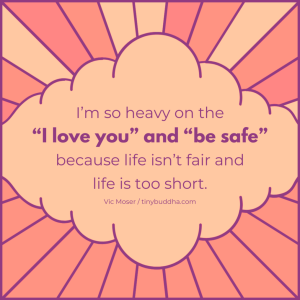
“On a deeper level you are already complete. When you realize that, there is a playful, joyous energy behind what you do” ~Eckhart Tolle
I was recently speaking with a friend about what it feels like to connect with your underlying, always-there state of well-being. I attempted to describe the indescribable—the feeling underneath the mental chatter that is who you truly are.
The peacefulness. The clarity. The stillness. I told her that in my experience, the most prominent feature was the deep knowing that all is well—that it always has been and always will be, no matter what might be happening on the surface.
Although my verbal description did almost no justice to the actual feeling, our conversation put her at ease. It put me at ease too.
As we visited that place in our minds, we felt the pressure of our thought-based lives lessen. My friend recognized a sense of truth in what I was describing as she reconnected with the peace that’s always there.
I’ve never met a person who doesn’t recognize that all is well feeling of peace. Many of us don’t live there on a permanent basis, but we’ve visited. I would be willing bet that we’ve all touched it at times, and that many of us experience it quite regularly, albeit fleeting or short-lived.
Yet, there are always people who will question that that state is who we really are. There will always be people who say:
“How do you know my true nature is well-being? What if mine isn’t?”
Or, “How do you know well-being isn’t the exception rather than the rule?”
They are great questions, aren’t they? I’ve asked them many times in my life. There were times when it felt likely that anxiety or insecurity were how I was wired—they were part of my default setting—with occasional blips of relief from anxiety and insecurity.
I would have bet the farm that there was something just a bit “off” in my nature—my mind was strung a little too tight from birth or my parents did something wrong.
Those “problems” were part of who I was, I thought. With enough therapy or self-help I might be able to counteract some of it, but it was going to take a lot of work and I was likely to slide back to my innate flaws at any time if I wasn’t careful.
So how can I be so confident now that every human on earth is essentially well with blips of pain, rather than essentially flawed with blips of relief?
1. You bounce back.
Humans effortlessly “bounce back” to peace and clarity when we feel separated from peace and clarity. Notice this the next time you’re upset: If you do nothing, meaning you don’t add to your upset by elaborating on your story, feeding into it, and bringing it back up in your own mind, it naturally fades. The slate clears and you’re bounced back to your more peaceful set-point.
It takes effort to stay mad. In order to say mad, you have to keep the thoughts creating the emotion of mad alive in your consciousness. You don’t usually recognize you’re doing this, but you are.
Here’s an example that happened to me recently: I was disagreeing with my husband about something and tensions were starting to rise. In the midst of our conversation, I kept noticing my attention shift. The kids were dancing around in the other room, the dog was snoring in the corner, what should we have for dinner tomorrow?
With each shift in focus I felt an accompanying break from the heavy feelings of the conversation.
At one point, when my son and daughter decided to strip down to their respective diaper and underwear and put on a show for us, I was totally unaware of what I was so upset about. The disagreement was literally gone in that moment. When their show was over I noticed the thought, “oh yeah, I’m mad” and dragged those tension-filled thoughts back into awareness.
The slate is cleared when you’re not holding on to old thought.
The fact that the slate clears by no effort of our own, always returning us back to a state of greater clarity and peace, convinces me that the clarity and peace must be natural and stable—our default, return-to-sender state.
If stress or anxiety was your natural state, why would you be bounced back to wellness so easily?
2. The less you do, the better you feel.
It’s generally true that the less you do, the better you feel. This makes perfect sense if wellness is your true nature. If who you already are is the perfection you seek, the act of seeking actually removes you from the well-being which is already yours.
When something is the default, you see it when you strip away anything that covers it. Think about an electronic device. When you click to “restore factory default settings,” programs, downloads, and all extraneous stuff are wiped away, leaving you only with the bare essentials.
The same is true when you see your extra stories, habits, and judgments for what they are—extraneous stuff. When you stop replaying them, focusing on them, and trying to fix them, they fall away. You essentially restore your “factory default settings” which means the slate is wiped clear and you feel less pressure than ever.
3. You strive to feel better when you’re down.
Ups and downs are a natural part of life for every human on earth. But have you ever wondered why you instinctively try to feel better when you’re feeling down?
If you weren’t wired for wellness, feeling bad would feel normal. If anxiety, insecurity, or fear were part of your innate wiring, those emotions would feel familiar and somewhat comfortable. But they don’t feel comfortable or familiar; in fact, we intuitively fight like hell to feel better.
We even call the process of going from pain to peace “getting back to normal.” Interesting, no?
Well-being is home. It’s what feels right and you will always feel out-of -whack unless you’re there. Well-being what you were born into and it’s where you will strive to return.
4. You were well as a baby.
I’ve never met an unwell baby. Physically unwell, yes. But I’ve never met a mentally or emotionally unwell baby. Have you?
We simply aren’t born this way. We aren’t born with confidence issues or a lack of self-love. We don’t come out judging our neighbors or setting unreasonably high standards for ourselves. I’ve never met a baby who was jealous or antisocial or narcissistic.
Babies have different temperaments. Some startle more easily than others. Some crave more attention than others. Those temperaments and preferences appear to be part of their innate makeup.
But they are all fundamentally well. Barring our judgment of them, they are all mentally and emotionally healthy.
I’m sure there will always be people who don’t see how their true nature could possibly be wellness. And that’s okay. But these are a few of the reasons that I began to believe it, and perhaps they might convince you too.
Life gets much easier and you notice those moments of peace much more when you believe that they are always there.
Photo by Abhishek Singh Bailoo
About Amy Johnson
Dr. Amy Johnson is the author of several books, including The Little Book of Big Change: The No-Willpower Approach to Breaking Any Habit. She is also the creator of The Little School of Big Change, an online school that helps people find lasting freedom from habits and anxiety. Please go here to get a free sneak preview of the school.













 Though I run this site, it is not mine. It's ours. It's not about me. It's about us. Your stories and your wisdom are just as meaningful as mine.
Though I run this site, it is not mine. It's ours. It's not about me. It's about us. Your stories and your wisdom are just as meaningful as mine.